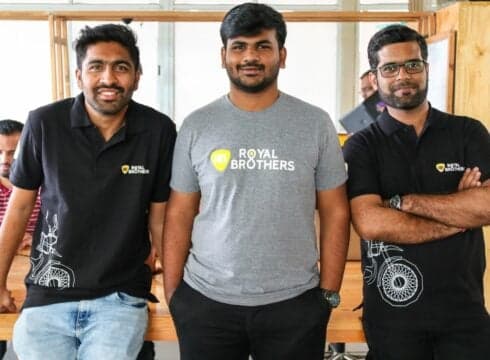Launched in 2015, Bengaluru-based Royal Brothers is operational across eight states and 25 cities
The startup has added monthly subscriptions to its hourly rental packages model
It claims to be delivering sanitised bikes and helmets to customer homes at no extra charge
Inc42 Daily Brief
Stay Ahead With Daily News & Analysis on India’s Tech & Startup Economy
From airlines to trains, to even local transportation — everything came to a standstill as India tried to flatten the coronavirus infection curve. But economies have to function and this would need people to step out of their homes, and so with the third phase of the lockdown in early May, the Indian government allowed mobility startups to resume operations with extra protection and safety measures.
The shared mobility space which finally resumed its operations recently is going through a complete overhaul. Considering that consumers will be wary of sharing vehicles with others, in recent weeks, many bike rental and two-wheeler ride-sharing platforms have pivoted their offerings. Bengaluru-based Royal Brothers, a two-wheeler rental startup, revised its hourly rental model to add monthly subscriptions.
Founded in 2015, it has since established presence across eight states and 25 cities and claims to be the first player in the category to start the subscription model. The new monthly subscription model is meant to counter the health risks posed by public transports, while also helping the customers practise social distancing. The subscription model has been adopted by a slew of bike-sharing companies as the market adapts to the new reality post the lockdown.
Besides this addition in its model, Royal Brothers is also looking to support those stranded across state borders. For this, it has opened up its fleet of motorbikes for intercity travel in eight states at concessional rates. It claims to be delivering sanitised bikes and helmets from the start location at no extra charge and also helps plan the itinerary for the traveller.
Customers can choose to rent two-wheelers for one, three, six, nine, or 12 months. Subscriptions come with no down payment, all that the customer is required to pay is one month’s rent to keep the subscription active and they can further extend the duration as per their need.
How Royal Brothers Rentals Will Change In Post-COVID World
When it comes to fleet options, the startup claims to have 50 different models of scooters and bikes available on the platform. While it is promoting a ‘bring your own helmet’ policy, but, in case it is required it offers thoroughly cleaned and sanitised helmets. Besides, the vehicle is sanitised and washed and is being delivered in a contactless manner, the company claims along with this, the GPS allows customers to easily contact the company in case of breakdown or malfunction.
During the tenure of the booking under the new plans, the customer can also avail free maintenance of the bikes from the startup. And finally, customers can exchange the bike during the subscription period for newer models or a different class of two-wheelers.
“All the additional benefits are purely keeping the consumers and their safety in mind. Today, every seven out of ten bookings from our platform are going to monthly packages and we see the numbers increase as the days and weeks go by.” Abhishek Chandrashekar, cofounder and CEO, Royal Brothers told Inc42.
A report by Research and Markets released in April 2020, revealed that the global shared mobility market is set to experience a slowdown due to the pandemic. The gross merchandise value (GMV) for the global market also took a hit and is estimated to grow by a mere 1.1% between 2019 and 2020.
With maturity in the market, there is bound to be a shift in consumer expectations around mobility too, and consequently the operating models. While mobility startups such as Rapido, Yulu, Bounce, Vogo, and others are back on the road, a lot has changed in two months of the lockdown. While earlier people were resistant to subscribing to bikes for a long period, human safety is an altogether different and massive consideration, which might force a behavioural change in consumers permanently. And that’s what many bike-sharing and two-wheeler startups are banking on to make the most of a tough situation.
{{#name}}{{name}}{{/name}}{{^name}}-{{/name}}
{{#description}}{{description}}...{{/description}}{{^description}}-{{/description}}
Note: We at Inc42 take our ethics very seriously. More information about it can be found here.


